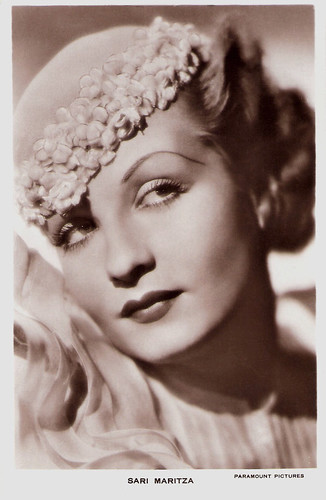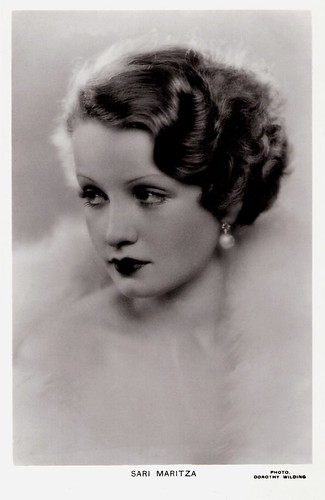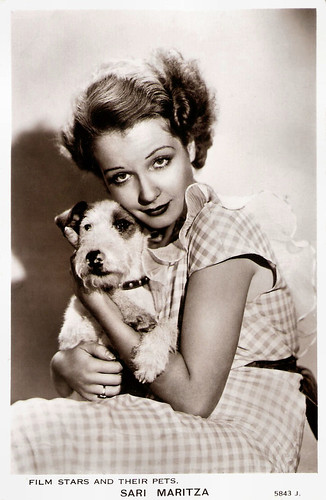
British postcard. Photo: Paramount Pictures.

Spanish postcard in the Hollywood (California) series. Photo: Paramount.
A tango with Chaplin
Sari Maritza was born Dora Patricia Detring-Nathan in Tianjin, China, in 1910. Maritza was the daughter of a British Army Major, Walter Nathan and his Austrian wife. She received her school education in England, Germany, Austria and Switzerland and was, therefore, linguistically well-equipped to appear in European films.
While in Vienna, Maritza caught the attention of the British talent coach and theatrical manager, Vivyan Gaye. Gaye persuaded her to change her name to the much more exotic Sari Maritza - taken from the titles of two then famous European operettas composed by Emmerich Kalman – Sari (also known as The Gypsy Violinist) and Countess Maritza.
She entered films in 1930 and starred in the musical Greek Street (Sinclair Hill, 1930), made by Gaumont British, and the comedy Bed and Breakfast (Walter Forde, 1930), starring Jane Baxter. She gained some notoriety for dancing a tango with Charles Chaplin at the British premiere of his film City Lights in 1931. Everybody assumed she would be his leading lady both on and off the screen. It was not so, but she had attracted attention.
She was cast in several low budget, but relatively popular British films, such as the drama The Water Gipsies (Maurice Elvey, 1932) with Ann Todd.
In Germany, Maritza made the German-British comedy Monte Carlo Madness (Hanns Schwarz, 1932) with Hans Albers. It was made by Ufa simultaneously in English and in German, as Bomben auf Monte Carlo (Hanns Schwarz, 1931) with Anna Sten instead of Maritza.

British postcard in the Picturegoer series, London, no. 592. Photo: Dorothy Wilding.

British postcard in the Picturegoer series, London, no. 592A. Photo: Paramount.
Not the new Dietrich
In 1932, Sari Maritza travelled to Hollywood. Paramount Pictures spent months perfecting her acting style before starring her in her first picture. I.S. Mowis at IMDb: “The connection between Ufa and Paramount was significant in launching Sari Maritza's brief Hollywood career. Paramount, always experimenting with continental actresses in the hope of finding another Greta Garbo or Marlene Dietrich, invented a fictitious, exotic background for her, though she was first, and foremost, English.“
The studio publicised her as its ‘new’ Marlene Dietrich. She made her American debut with the lead in Forgotten Commandments (Louis J. Gasnier, William Schorr, 1932), a framework story which serves as context for a retelling of the Exodus story and a recycling of footage from the silent version of The Ten Commandments (Cecil B. DeMille, 1923).
She next starred for Paramount in Evenings for Sale (Stuart Walker, 1932) with Herbert Marshall, and the comedy International House (A. Edward Sutherland, 1933) with W. C. Fields and Bela Lugosi. For RKO, she made The Right to Romance (Alfred Santell, 1933) with Ann Harding, Robert Young, and Nils Asther. Her American films were poorly received.
In the US, she was portrayed as an exotic European vamp with emphasis placed on her mother's Austrian heritage, but Maritza had lived most of her life in Britain and disapproved of the studio's attempts to create a more mysterious façade for her. The low-budget World War I drama Crimson Romance (David Howard, 1934) with Erich von Stroheim would be her last film.
In 1934, she married MGM producer Sam Katz and retired. In later years, she admitted that she had been eager to end her career as she did not consider herself to be a capable actress. The couple divorced ten years later. Maritza worked for a lens manufacturer during World War II. Her second husband was George Clother, an Air Force navigator. Sari Maritza died in 1987, aged 77, at her home in the US Virgin Islands.

British postcard in the Film Stars and Their Pets series by Valentine's, no. 5843 J. Photo: Paramount Pictures.
Sources: Hans J. Wollstein (Meanwhile... Back at the Ranch), I.S. Mowis (IMDb), Emma (Let’s Misbehave), Wikipedia and IMDb.
This post was last updated on 13 May 2025.
No comments:
Post a Comment